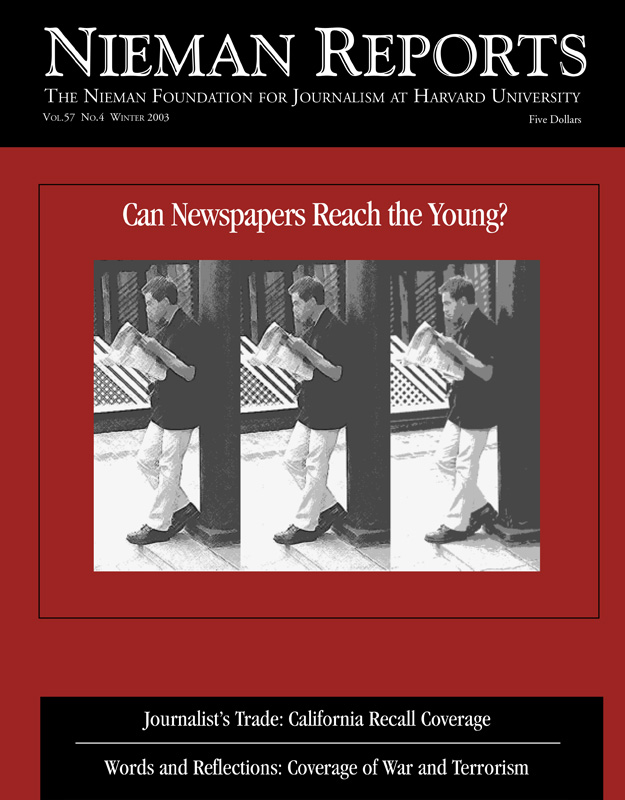With its unusual purpose and Hollywood celebrity, California’s autumn recall election became an archetypal mix of entertainment and news reporting. Lessons from its reporters shed light on some of the changing realities of political coverage.
After a 13-year break from political reporting, former San Francisco Chronicle columnist Mark Simon was back on the campaign trail. He reflects on changes he observed, most strikingly the impact of the Internet and the self-absorbed way the political press perceive their role and work. We are, he writes, in “an era in which the reporter has become more important than readers or voters.” Jim Bettinger, director of Stanford University’s John S. Knight Fellowships for Professional Journalists, contends that political reporters—by savoring and relying on the established political process—risk becoming irrelevant “to a political process that may be undergoing fundamental change.” The consequence: “the established media are seriously disconnected” from citizens, whose profound anger they failed to understand.
In nine weeks of campaign coverage, Marjie Lundstrom, a senior editor and columnist with The Sacramento Bee, never saw or spoke with a candidate. Her assignment was to “go find people” and learn from them what this election was about. With photographer José Luis Villegas, whose images appear with her words, Lundstrom’s series illuminated “the essential truth about this election: Voters were steamed. The anger was palpable.” Meanwhile, the Bee’s veteran political columnist Dan Walters was seeing how Arnold Schwarzenegger’s campaign capitalized “on his celebrity … to go around us scribblers” and “convey his message of saving California so effectively.” Also at the Bee, Daniel Weintraub, the paper’s Weblogging political columnist, was finding the fast-moving campaign to be “a perfect marriage of medium and message,” as his blog continuously passed along “political scuttlebutt and speculation.”
Cecilia Alvear, NBC News producer, and George Lewis, NBC News correspondent, who brought the campaign to a national TV audience, admit frustration at how “the image of the smiling superstar candidate was more powerful than the words.” Dan Morain, who reports on the influence of money on politics for the Los Angeles Times, writes about the enduring value of this watchdog beat. “Tracking money was an essential part of covering the recall race or, indeed, any campaign,” he writes. Pilar Marrero, political editor and columnist at La Opinión, reflects on how often journalists relied on her to report on what Latinos thought about the election, instead of reporting the story themselves. As she writes, “I’ve never seen a colleague of the mainstream media being asked, “What do Anglos think about this?” Photographers from La Opinión covered the campaign, and their images appear in this section.
And Ellen Ciurczak, a longtime radio reporter, describes her difficult transition to becoming a freelance political journalist during the recall. “I found myself watching some of the worst partisan politics, hypocrisy and grabs for power I’d ever seen while covering state politics in California,” she writes. “This stirred strong feelings in me, feelings that caused me to lose faith in my news judgment.”


